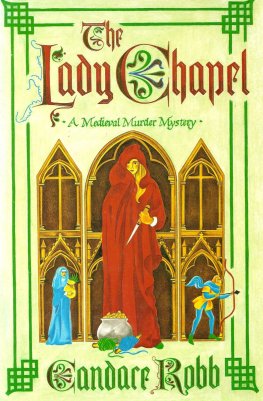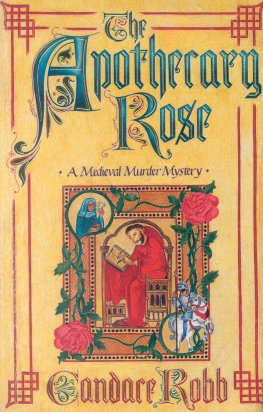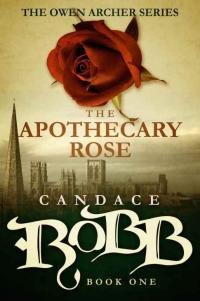Candace Robb
The Owen Archer Series:
Book Seven
A SPY FOR THE REDEEMER
2002
For Patrick and Evan, my dear friends who represent me to the world
For devoting their time and sharing their knowledge throughout the imagining and writing of this book I thank Lynne Drew, Kate Elton, Sara Ann Freed, Joyce Gibb, Jeremy Goldberg, Fiona Kelleghan, Evan Marshall, Nona Rees, Compton Reeves, Charlie Robb, Patrick Walsh, the staff of the National Library of Wales in Aberystwyth, and my colleagues on the Internet discussion lists Mediev-l, Chaucer, and Medfem. Any mistakes are surely my own.
archdeacon: as was (and is) customary, the archdeacons of St Davids were appointed by the bishop and carried out most of his duties; however, because the Bishop of St Davids was the lord of the March, his archdeacons were men of considerable power
butt: a mark or mound for archery practice
certes: certainly, to be sure (middle English)
demesne lands: the land immediately attached to a mansion, and held along with it for practical or pleasurable use; the park, chase, home-farm, etc.
houppelande: mens attire; a flowing gown, often floor-length and slit up to thigh level to ease walking, but sometimes knee-length; sleeves large and open
jongleur: a minstrel who sang, juggled, tumbled
Lady Chapel: a chapel dedicated to the Blessed Virgin Mary, usually situated at the east end of the church
leman: mistress
liege lord: the superior to whom one gives allegiance and service
Marches/Marcher Lords: the borders of the kingdom and the lords to whom the King granted jurisdiction over them
mazer: a large wooden cup or bowl, often highly decorated
minster: a large church or cathedral; the Cathedral of St Peter in York is referred to as York Minster
no fors: does not matter (middle English)
seneschal: in the household of a sovereign or great noble the official who administers justice and controls domestic arrangements
scrip: a small bag, wallet, or satchel
solar: private room on upper level of house
summoner: an assistant to an archdeacon who cited people to the archbishops or bishops consistory court, which was held once a month. The court was staffed by the bishops officials and lawyers and had jurisdiction over the diocesan clergy and the morals, wills and marriages of the laity. Also called an apparitor.
tabard: a loose upper garment without sleeves
trencher: a thick slice of brown bread a few days old with a slight hollow in the centre, used as a platter
vicar: as a modern vicar is the deputy of the rector, so a vicar choral was a cleric in holy orders acting as the deputy of a canon attached to the cathedral; for a modest annual salary the vicar choral performed his canons duties, attending the various services of the church and singing the liturgy
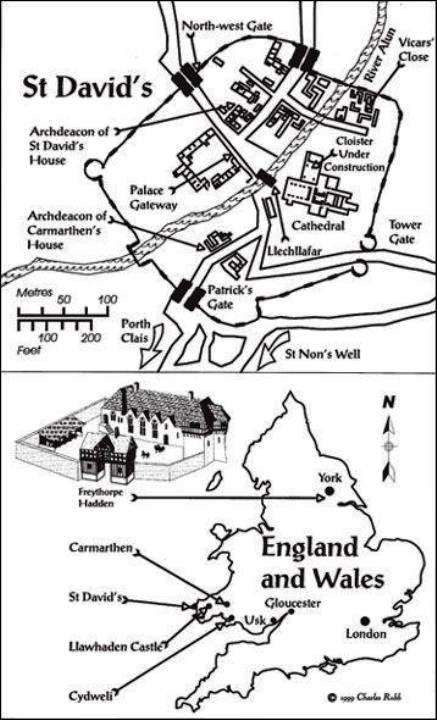
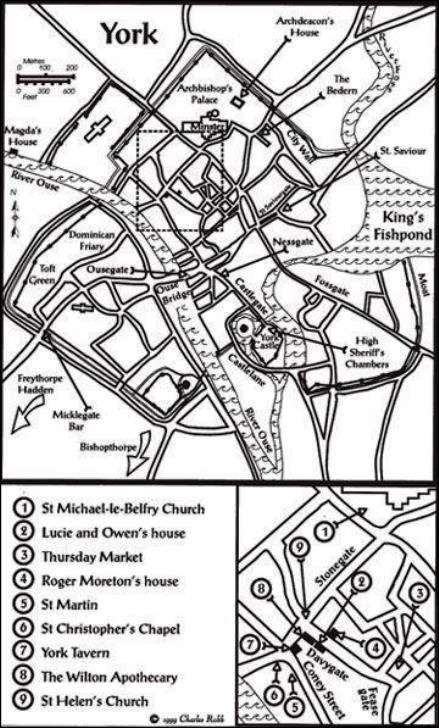
A shaft of early morning sun shone on the effigy, enlivening the cloth carved to drape gracefully over the stone torso. Ranulf de Hutton thought if he stared long enough the stone folds would lift and fall with the statues breath, so real did it look in this light. God had blessed his fellow mason Cynog with enviable talent. But Ranulf had as much skill if not more. Why had he not been chosen to work on the tomb?
He was the senior mason working on the cloister walk and chapel at St Davids Cathedral, always the first mason chosen for decorative work. Why had he not been granted the honour of fashioning this tomb? The English knight had died while on pilgrimage, after being blessed with a vision at St Nons holy well. Cynog did not deserve the honour of working on such a mans tomb. This past year he had been slow in his work, distracted by repairs to a wall in an archdeacons cellar that should have been assigned to an apprentice, ever late returning from his visits to his parents farm outside the city.
As he was this morning. Already the apprentices and journeymen worked in the stonemasons lodge, smoothing, chipping, the stone dust spiralling in shafts of sunlight from the open sides. But no Cynog. Ranulf regarded the tomb. The face had not yet been brought out of the stone, nor arms and hands. Still so much to do. He ran his hand over the rough stone from which would grow the face, remembering the old knights cheekbones, his gentle smile.
What say you. Does it please?
Ranulf turned round with a gasp. Cynog!
The tardy masons tunic was crusted with mud on one side and his boots were caked in it. Yesterdays rain had continued well into the evening. You slept without the walls of the city? Ranulf asked.
In the wood, aye. Rolled off my cloak and look at the damage. Cynog brushed the tunic with his long-fingered, delicate hands. The hands of an artist he had, as well as the eyes, deep wells of soft brown, seeming ever wide with wonder. Though this past year they had taken on a melancholic cast.
Ranulfs envy dulled, replaced by relief to see his friend back before the Master discovered his absence. You have come in good time, no matter. And what of Glynis? Did she meet you at the city gates Saturday evening as promised?
Cynog lowered his head. She came, aye. Only to tell me she would not make the journey with me. He swung his fist sideways, hitting a lodge pole. The mariner cannot love her as I do. I sacrificed my honour for her. She is my life!
Ranulf had thought the young womans recent friendliness merely a tease. She walked away from you in the autumn, my friend. It is now late spring. How can you still hope? And yet, against all reason this, too, Ranulf envied. He had never been so besotted with a woman as Cynog was with Glynis. He could only imagine the passion. To be so alive. But you lost no honour by her leaving you. Do not think it.
Cynog ran his fingers over the unfinished tomb. There are already many pilgrims at the cathedral door, he said, changing the subject, another irritating habit of late. I thought you hoped to repair the font before they entered? The flood of pilgrims during the day made work in the public parts of the church difficult.
Oh, aye, I must do that, yes. Ranulf picked up his sack of tools, tied it round his waist. Cover yourself with an apron. No need to provoke the Master Mason. He grasped Cynogs shoulder. Work on the face today. You cannot think of her, or your pain, while freeing Sir Roberts face from the stone. And who knows, the holy knight may intercede for you, or ask the Queen of Heaven to do so.
Make Glynis love me?
Nay, friend, heal your heart.
On a May day that hinted at summer, such a day on which the people of York rejoiced in opening their doors to the warm, fresh air and found excuses to walk along the river in the sunshine, or to walk out on to the Strays to check on their grazing animals, Lucie Wilton and her adopted son, Jasper, were shut up in the apothecary, staring down at the mound of dried herbs a customer had just returned. The tension between the apothecary and her young apprentice seemed to suck out the air. Jaspers cat scratched at the closed shutter, begging to be released.


